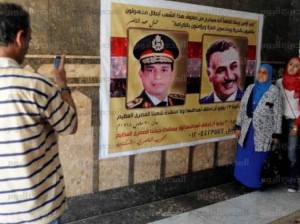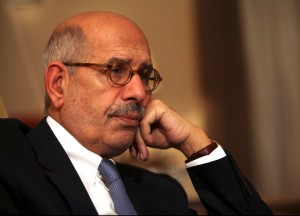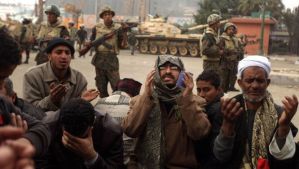Article first published at The Huffington Post.
__________________________________________________________
A six by twelve billboard greeted me on my drive from Cairo airport to my apartment, less than a mile away from former president Hosni Mubarak’s presidential palace. “Egypt Fighting Terrorism” in bold lettering in Arabic and English, and a determined looking child with the Egyptian flag painted on his cheeks completed the picture.
Endless Egyptian flags hang across apartment balconies and drape horizontally across civilian buildings. There is no escaping it: Egyptians have fallen for their country again.
At the centre of this romance is the shrewd man in uniform and Commander-in-chief of the Armed Forces, General Abdel Fattah el-Sissi. And if Egyptians could personify their love for Egypt right now, that personification would be el-Sissi himself.
Since July 3, the day that saw former president Mohamed Morsi ousted, and consequently launch a thousand TV panels across the world about whether Egypt had undergone a coup or not, el-Sissi’s popularity cannot seemingly grow any more than the heights it has already reached. Apart from a brief defensive operation to global media trying to dispel the notion that Egypt’s democratic transition had been hijacked by the military, you will not find many Egyptians who care anymore whether the world understands or not. You only need to drive around Cairo for half an hour to see that the semantic debate over July 3 is finished: el-Sissi and the army are in; Morsi and the Muslim Brotherhood are out.
El-Sissi mania is everywhere. From biscuits and cupcakes adorned with his face being sold on high street vendors, to speeches being made at weddings praising him for saving Egypt from “terrorists.” Television hosts and guests mostly have nothing to say that would demote him from anything less than a Demigod, and even leading politicians and former presidential candidates have essentially paved the way for el-Sissi to run and sweep presidential elections if and when they happen.
El-Sissi has so far played it cute on the “will he or won’t he run” question. Yet realistically, the odds that a man, who enjoys the fanfare that even Egypt’s most popular actors and pop stars could dream of, will not heed this call but rather return to obscurity, are extremely unlikely.
Unlike the group he dismissed from government, the Muslim Brotherhood, el-Sissi has thus far been non-committal about whether he will run or not — a mistake the Muslim Brotherhood made when they adamantly insisted they would not field a candidate for the 2012 presidential elections, only to then backtrack and consequently turn the wheels of suspicion towards them that they craved every opportunity of power.
Yet, el-Sissi is doing exactly what he needs to do to keep people talking about him, and sooner rather than later, it will no longer be about when presidential elections take place, but rather, when will el-Sissi “accept” the will of the people for him to be its president. The last time he asked the public to take the streets to support him was in the fight against terrorism, and the way his stock has continued to rise since July 3, there is little doubt that if he asked the people to decide whether he should run for the presidency, he would find mass support once again.
Of course, el-Sissi as president would be a major vindication for many around the world who cannot get past the word “coup”, not to mention the Muslim Brotherhood themselves, stating that el-Sissi’s intervention three months ago had nothing to do with restoring democracy but in fact a massive set-back to the democratic process. The military general, who overthrew the democratically elected president, and then taking the up the mantle of president himself, would be the final proof they need. If el-Sissi does eventually occupy the presidency, Egypt will just have to endure this criticism just as it did in the immediate aftermath of July 3.
Egypt is often compared to other countries that have or are going through a similar transition. These are often useful but limited, and perhaps a more rewarding comparison would be to compare the Egypt of today with the Egypt of only eighteen months ago. Under military rule under former Commander-in-chief, Hussein Tantawi, who el-Sissi succeeded, it took less than a month for many to turn against the army. In January and February 2011, while millions took to the streets to remove Mubarak, protestors sang national songs about the unity between the people and the army. But Tantawi lacked both the personality and shrewdness of el-Sissi. And perhaps most importantly, Tantawi forgot the most basic military tactic which applies to politics just as it does on the battlefield: divide and conquer. Tantawi failed to produce an alternative enemy of the state after Mubarak’s removal, and with Mubarak gone, Egyptians voiced their anger and discontent with Tantawi and military rule who were a blunt force when a softer hand was needed.
El Sissi, however, has not made that mistake. Despite most of the Muslim Brotherhood leadership being arrested or on the run, as well as the fateful dispersal of Muslim Brotherhood sit-ins that led to over a thousand killed, el-Sissi appears to recognise the vital importance of maintaining his popularity by keeping the threat of the Muslim Brotherhood alive, and at the forefront of the minds of the Egyptian populace.
And it is working. Keywords like “the Hamas threat” and “Islamic terrorism in Sinai” dominate Egyptian media, who have become the voice box of the interim government and el-Sissi. “The threat is not over, but just beginning” is the headline message, and moreover, in less than three months, the label “Ikhwan”, referring to the Muslim Brotherhood, has now become the umbrella term for all forms of Islamic terrorism, ensuring that the group’s name is now synonymous with being the number one enemy of the state. If at any stage el-Sissi needs to retain his popularity, all he need to is mention the “Ikhwan.”
It is hard to imagine any politician wishing to run for the presidency while the prospect of el-Sissi running remains a very strong possibility. Egypt has always had a paternal relationship with the presidency, a relationship that Mohamed Morsi failed to fulfill, but a role that el-Sissi already occupies. Only time will tell if el-Sissi will resist the temptation of the presidency, but if he does not, and the popularity he receives today is anything to go by, it will be less of an election, and more a Roman triumph mixed in with a coronation.


